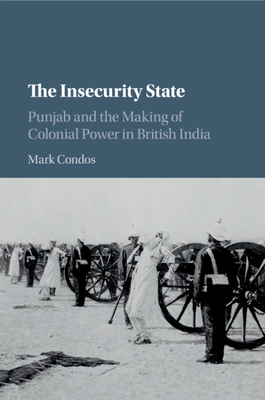

 Cambridge University Press
Cambridge University Press
The Insecurity State: Punjab and the Making of Colonial Power in British India


Key Metrics
- Mark Condos
- Cambridge University Press
- Paperback
- 9781108407014
- 9 X 6 X 0.58 inches
- 0.81 pounds
- History > Asia - India & South Asia
- English
 Secure Transaction
Secure TransactionBook Description
Author Bio
Mark Condos is a historian interested in the intersections between violence, race, and law within the British and French Empires, with a particular focus on India and Algeria.
He completed both his BA (Hons.) and MA at Queen’s University in Canada. In 2013, he received his PhD from the University of Cambridge. Prior to joining King's College London in January 2020, Mark held a Leverhulme Early Career Research Fellowship at Queen Mary, University of London, between 2014 and 2017, and subsequently worked as a Lecturer in Imperial and Global History between 2017 and 2020.
Research Interests
His previous research has examined the relationship between militarism, violence, and state-building in colonial Punjab and along the North-West Frontier of British India. This work explored how colonial anxieties, fears, and vulnerabilities played an important role in determining the authoritarian and often violent practices of the British colonial state.
Mark has also written extensively on the phenomenon of ‘fanaticism’ along the North-West Frontier of British India, tracing the colonial origins of some of the key legal and discursive tropes in contemporary engagements with terrorist violence.
He is currently working on two different projects. The first examines how various forms of legal and extrajudicial violence were incorporated by the British and French empires in their attempts to police different frontier regions, with particular emphasis on the ways that Indian revolutionaries used the tangled legal geography of British and French India to carry out their activities in the early 20th century. The second project looks at how concepts of prestige, dignity, and honour informed imperial practices of retributive violence, and the ways that imperial powers attempted to justify these within legal, moral, and other normative frameworks.
Colonial India and Punjab
Imperial and global history, c. 1750-1947
French Algeria
Colonial anxiety, fear, and terror
Anti-colonial resistance and insurgency
Race and violence
Law
Imperial policing and pacification
Frontiers
Empire
Source: King's College London
Videos
No Videos
Community reviews
Write a ReviewNo Community reviews